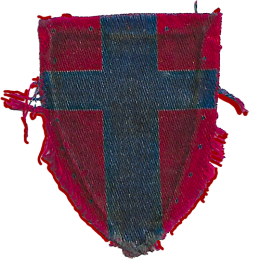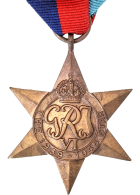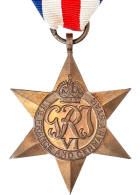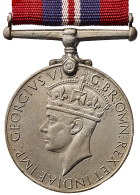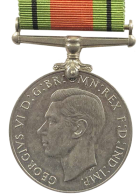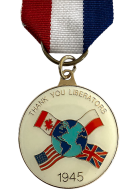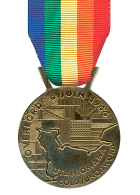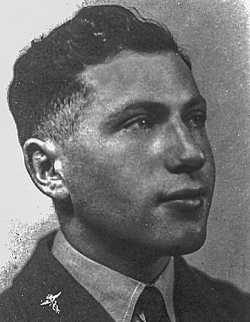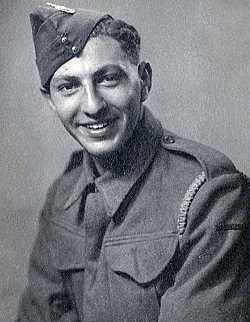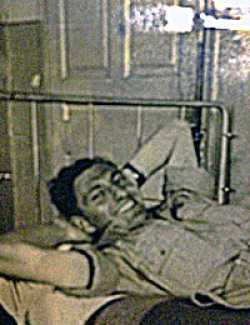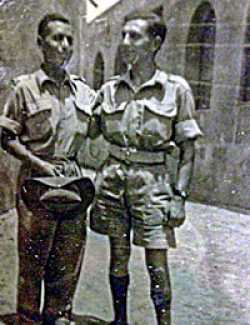Tillie was also born in the East End of London, but moved when she was three or four to Canterbury. She went to college and trained as a shorthand typist, which was very unusual for a woman, because at that time it was almost only men who worked in offices. In 1919 she was introduced to David Kersh, and they married that year. David and Tillie had their first child on 30th April 1921 and he was called Cyril. The next year, on the 3rd of October, they had a daughter called Lilian. They then bought, and moved to, a big house very near where Sir Walter Raleigh had once lived, on Brixton Hill, to be near her sister Betty in Fairmount Road, and, her parents in Lambert Road. On 20th December 1924 they had another son called Mervyn, and that was me. Lambert Road was the next turning to us but, due to the lack of a connecting road, we had a fair walk to reach my grandparents and as a young child, it was a very long walk for me. The houses were a mere 100 yards apart but as we were not crows we had to walk the long way.
On 3rd September, 1939, Britain joined in the 2nd World War. The U.K. at last realised that Germany was growing rapidly in strength but the hope had still been that she would attack the USSR. That was physically not possible without Poland under her control. But it was now obvious that Britain’s pretence of believing Hitler’s promises of “no more territorial demands”, had run its course. That wishful thinking was responsible for the betrayal of her Treaty with Czechoslovakia, France and the USSR – all “in the cause of peace”. Words we were to hear again and again for decades later. The lesson has never been learned and is echoed today. “Even-handedness” is still the code word.
Finally, with the Non-aggression Pact with Stalin and the invasion of Poland, even the British government was forced to realise that Germany had to be stopped before the balance of power in Europe was changed for ever in Germany’s favour. It was, of course, already too late.
Two days before that British declaration of War, schools in the big cities were evacuated to the “safe” countryside. At the age of 14. I was evacuated to a village called Tallatan near Exeter. I went there with my mother’s sister, my Aunt Betty, and Uncle Len who taught at the evacuated school. That was the reason I had been evacuated with him, as my own school, The Reay, went to Reading but my parents wanted my uncle and aunt to be able to look after me, even though the school age finished at 14 and therefore lower for me educationally.
I clearly remember how, in the village cottage where we were billeted, we were gathered round the wireless awaiting the Prime Minister’s important announcement. That morning of Sunday, 3rd September 1939, the Prime Minister, Neville Chamberlain, announced that we were at war with Germany. My first instincts were excitement, but I nevertheless knew what the concept of modern war was. I had seen news reels of the German bombing and “strafing” of civilians in Spain and now in Polish towns as the Germans invaded and swept forward. Civilians had always been casualties in wars but this time they were targets in themselves for the German barbarians.
Whereas Chamberlain had flown in haste to meet “Herr” Hitler , when it came to try to talk to Stalin, Chamberlain took a slow boat – and arrived too late to stop the signing of the non-aggression pact between Germany and the USSR. The studied insult had spurred Stalin on. Poland was partitioned.
The communist line was that the USSR had “saved” half of Poland from the Germans and to some extent this was true, but a different fate awaited the Poles and also the Jews. Whereas German ideology was based on race, communist ideology was based on class. Unlike many persecutions of the past “conversions” in either case were impossible.
In the U.K. it was compulsory at the time for men of 19 to join the forces and was called conscription, but of course I was too young. I liked the life in a small village, and was happy that I was with Uncle Len and Aunt Betty and my cousins, Esme and Sylvia as well as the other younger children from the school. We would walk in the fields and help on the farms with the hens, walk to Wimple of cider fame and Ottery St. Mary, and it was also a whole new experience to be away from my parents and siblings. Previously camping with JLB for 10 days each year, had provided the only parting and this was an adventure.
There were also three young Jewish boys, two of whom were brothers, living with us in the cottage. They had just escaped from Germany on the Kindertransport. Britain had finally allowed 10,000 Jewish children to enter the UK provided that their parents did not come as well. The parents, of course, were later killed by the Germans in the Holocaust. These three boys aged seven to ten could not speak any English, I tried to teach them a little and they taught me some German. Because of the language barrier I learned very little of what they had suffered before escaping Germany except that the Germans had banged on their door and grabbed the older members of the family and they had not seen them since nor would they.
My parents had rented a flat in Torquay at the start of the war and my grandmother was with them. I quickly transferred from Tallaton and joined a local Central school. However, we soon returned to London within a couple of months as the “phoney War” brought no air raids and I, of course, went back with them. The flat was in a small block of maisonettes and overlooked a cemetery which was not a pleasant outlook. At my new school, Homelands, I remember learning to play rugby which I thought was a silly game where we spent most of the time in mounds of bodies. I also started to learn economics. But I was only there for a few weeks
This was the preparation for the invasion of Britain. Denmark, Norway, Holland, Belgium and France had already fallen in one swoop. A large part of the British Expeditionary Force in France had managed to be evacuated from Dunkirk, (albeit without any equipment) by small boats under German air fire. Britain was to be invaded next and there was much talk in high places of making peace. Voices were raised to claim that if we made peace with Germany, we would be “allowed” to keep our empire and left to rule ourselves.
Army days
Thus began my military career. I wanted to join the air force, like Cyril before me, as I preferred the uniform and there were better living conditions, but as he was abroad at the time, he could not “claim” me and I had to enter the army about which I knew nothing. I underwent intensive training for six weeks where I was taught basic military life. I enjoyed it despite the June snow in Lanarkshire. My training since I was eleven in the Jewish Lads’ Brigade had prepared me for marching, rifle drill, map-reading, boxing, physical training (I had been on a course as a PT Instructor in the JLB) and general discipline. It was suggested that I apply for WASB (War Army Selection Board) for consideration for a commission. I rejected it out of political conviction of class loyalty. I soon regretted that decision.
At the end of that primary training the whole intake were assembled on the parade ground – about 1000 of us. Our names and numbers were called out and we went to a marker as directed. My marker turned out to be for the Ordnance Corps, something of which I had never heard. During the training we had had various aptitude tests and interviews to find out what we were best suited for and as I had a hobby of drawing maps for the purpose of following the front line advances and retreats, I half expected to be chosen for the Ordinance Survey section of the Royal Engineers (my eyesight ruled me out of an infantry unit). It seemed that somebody could not spell and, on enquiry, I found that it was too late for me to be changed. So, stores it was to be. The oldest corps in the British army, going back several centuries. I was sent to a Clerks’ and Storemen’s School in Saltburn-on-sea in Yorkshire for four weeks and we lived in a converted hotel on the sea front. I passed that Class 3 course with 98 percent and was sent on leave with orders to report to a Motor-Cycle unit in Birstall near Leeds afterwards. The leave went far too quickly. At my first new unit which was small, my new Commanding Officer, Lt. Loose, was very informal. When he saw my home address, he told me that his grandfather lived in Trent Road and did I know him. As it happened, I did, though only slightly, and from then on we were first name buddies.
Our job was to receive new motor cycles and despatch them to various units by lorries (now to be known as trucks in deference to the Americans!). This gave me my first opportunity to ride a motor bike up and down the high street. They were from small Velocets with 300 hp to giant Indians with 1200 hp. I lived on chips from the local shop and enjoyed local dances. It was very rural life. I also had my Aunt Sarah’s brother-in-law living in Leeds and that family really made me at home. I ate (frequently and in large amounts) as often as I could get to nearby Leeds and one of the daughters tried (in vain) to teach me to dance. Another was an ardent communist and we had long discussions and, later, an enormous correspondence, which lasted until I was in France and we then lost touch. We met again many years later at a family function but we both had changed very much by then. I was soon sent to nearby Dewsbury for an upgrade Class 2 course for two weeks but, I later learned, I was given a class I paper to sit, by mistake, but as I had passed that with 90 odd percent they let it stand and my pay increased to a that of a First Class Tradesman, a few pence – in record time as six months gap was officially required between each upgrade.
On active service
I returned to my unit and it was soon to be that I was told to report to 11 Advanced Ordnance Depot in Quernmore Park in Lancashire for the formation of an overseas company for the invasion of Europe. I, who had long been in favour (an “Agitator”) of the second front in Western Europe, was delighted. On December 7th, I made the train journey across the Pennines to my new location only to be greeted as soon as I had unpacked, with the observation that I was not yet 19 and I had to be that age to qualify for overseas service – even though I was not going overseas immediately. I crawled back to Birstall to sit out the two weeks until my 19th birthday on the 20th Dec. I then repeated my journey noticing the bill-board hoardings which read “Is your journey really necessary?”
Being December, the weather was very cold indeed and we were in a former park with trodden snow and slush everywhere. We – others were joining us daily – lived in corrugated zinc huts called Nissan with a central coke fire giving off terrific heat but only within a yard and up the chimney pipe. Since we had to go some distance to the dining mess I rarely took off my greatcoat. We all worked at our various jobs within our host unit, 11 A.O.D, as we were being formed from scratch as 17 Transit Vehicle Park, 17 Advanced Ordnance Depot. They were responsible for our administration which included guard duties, fire-picket duties, leaves and passes at week-ends.
In charge of all this was a Regimental Sergeant Major nicknamed “Tojo” as he resembled the Japanese Prime Minister, who took a dislike to me from the start. I was on guard duty or fire-picket patrol or mess duties almost every night and week-ends. When I finally made a protest, I was told that my selection was “purely at random”. I was sure that it was anti-Semitic for there could be no other reason, and was very miserable. I could do nothing about it except desert, which I did seriously consider. But since my Company was for the Second Front, and since that could not be put off for much longer as the Soviets were at last advancing having destroyed or captured the German Sixth Army at Stalingrad, I reasoned that the Western Allies would want to be in force in central Europe before the Soviets. I decided to stick it out. The whole camp had been a private estate and was once surrounded by iron railings with gates at one end. These had all been requisitioned for the war effort and so the park was open except for two ornamental gates. It was officially assumed that any stray Germans trying to sabotage our depot would surreptitiously enter through the gates and not through the open perimeter of the park! The guard was there to prevent such a formal entry! One early morning on guard duty in the only sentry box I ever saw, I waited in vain for my relief to arrive from the guardroom and fell asleep upright. At that very moment, the Duty Officer came round to inspect the guard and found me in dereliction of my duty by sleeping. The guard commander, a sergeant, was also arrested for sleeping and thereby not seeing that I was relieved on due time and we were brought before the C.O. in the morning. The guard commander was let off as he had been working for far longer than regulations allowed. I was told that I was a disgrace to my uniform, my unit and myself as I was on active service even if not yet overseas. In the 1914/18 War I would have been shot! I managed to point out the futility of the whole exercise. I was sentenced to three days under close arrest which meant being confined to the main Guard Room and escorted to meals with an armed guard. And loss of pay for the three days. I survived that ordeal. I also got on well with the Commanding Officer, Major Lee, after that.
On the few occasions when I was able to go to Lancaster, I visited the Church of Scotland Canteen to get some (a lot) sandwiches to eat and went to the only cinema for warmth. Unfortunately, the “liberty truck” which took us and picked us up for return, always left town at 11 pm – and the film always ended at 11.15 pm so we either missed the end of the film or we missed the truck in which case we had to run most of the three miles back to camp to be there before midnight. But the day came, after nearly three months, in early spring 1944, when we moved to Shropshire. At last we were functioning as a self-supporting, independent unit. There was a Jewish Club in the local town of Wellington and hospitality was marvellous. My parents even came down to see me and stayed a few days and I began to enjoy life again. We knew that the Allied invasion of Europe was drawing closer. We had learned with frustration of the amazing resistance by the Jews in the Warsaw Ghetto to the might of the German army and air force. They lost in the end but their fight against the Germans inspired every Jew – and others – in the world. This was the first massive resistance in Europe and lasted much longer than the German High Command anticipated – especially from Jews. If the birth of a renewed Jewish State took place in 1948, then the conception of that State took place in Warsaw. It was time that I played my part in that renewal. I was impatient. As the Soviet Foreign Minister had said something like: “Do not wait until the last button is sewn on the last uniform before you open the Second Front”. Nevertheless, we did wait until everything was in order so that there would not be failure when we did land in western Europe. There was no room for another Dunkirk or Dieppe.
The day came in May when we again moved: this time to Sussex at Billingshurst which was in the Concentration Area. Here we were in tents but the weather was much warmer by then. Within a few days we were told that we were no longer able to leave the camp or use a telephone. All letters out were censored. The invasion – I preferred to call it the “liberation” – must be very close. My cousin Esme was due to be married on 4th June and I realised that even if we were still in Sussex, I could not attend. I managed to get out a message that I could not be there but that was all. My family guessed the reason.
We were given the Order of Battle at the beginning of June so I knew that I was to cross on D+4 to wherever we were going. All the beaches had code names and sections of each beach had another so I knew where, in relation to others, we were to land but, of course had no idea where the beaches or coast were. D was, of course, the Day that the invasion was to start.
My 17 Transit Vehicle Park, the advance company of 17 Advanced Ordnance Depot, handled every possible vehicle from tanks and 48-wheel tank-transporters to folding bicycles. My job as Technical Clark was to ensure that we never ran out of pre-ordained quantities of any single vehicle. We used a system of stock control which was used by Littlewoods for their thousands of stock items. It was all done by hand entries on cards called Visidex. As forward fighting units lost vehicles, we replaced them and indented (ordered) more back up stocks from the rear depots in the U.K. At first this was ad hock but we soon became organised. Other parts of 17 AOD dealt with the thousands of spare parts for all these types and makes of vehicles. Our senior N.C.O. was a man called Turner. His rank (in the RAOC alone for historic reasons) was Sub-Conductor. He had been a bus conductor in civilian life so the title was often deliberately confused. He once called me into his little office and demanded to know why the men called me Mr Kersh when I was only a private, while they did not call him Mr Turner when they should have as a senior Warrant Officer. I diplomatically said that I suppose that it was matter of respect. He just accepted that without apparently realising the inference.
My close friend, Jack Cotter, ran the Administration Office while the Officers were dealing with the their discipline, pay, training and welfare of the 200 drivers who made up 17 TVP. Jack was a Welsh nationalist and we had many discussions about Wales and Israel and we also used to sing a lot as he (also?) had a good voice. We taught each other our own songs. I loved his Welsh lilt and recall him whenever I hear that lilt from other people. I only saw him once after the war. I located him from his description of the quarry he had worked in as transport manager and stayed with him overnight but by then he was married and we had little in common any more. I also befriended a young Lieutenant and we had many discussions on many levels. He was in charge of the Tech (nical) Office and was my direct boss. The Commanding Officer of 17 AOD, Colonel Gore, assembled the 800 of us one day and told us that ten officers and men had been selected for the first reconnaissance group, landing on D-Day. They were to comprise one of each rank with himself included. The only private was a cook. My Lieutenant friend was among them. They left on what turned out to be D-1. We heard the news by radio of the early D-Day landings and we packed up and were ready to leave within an hour
As we travelled in convoy down to Gosport, the roads were clear but the roadsides were filled with people calling out blessings and good wishes such as “Good Luck”. In some places they were completely silent. It was all very moving for us including the not knowing what would happen when we landed. We had no idea of what had already happened in Normandy. I was proud to be a part of the BLA, the British Liberation Army, later to be renamed as the British Army of the Rhine (BAOR). I could visualise my family’s fears for me.
We arrived at Gosport and parked in side streets where housewives poured non-stop drinks for us. We were on rations of tinned meat-and-vegetable soup followed by tinned peaches and then tea. The soup I could not touch, not being kosher, but I enjoyed the peaches and ignored the tea. Just before we left Billingshurst, our Captain had to go to London to collect some secret documents. He went by motor cycle but foolishly stopped on the way back at a café for lunch, leaving the briefcase with the documents in the pannier bag on the bike – and the bike was stolen. He was put on a charge and kept under close arrest being under armed guard at all times awaiting court-martial.. He did not cross over with us.
He was replaced with an infantry Officer named Capt. Baldwin who knew less than nothing about our work. He said that he would leave everything on the technical side to me. At Gosport he somehow noticed that I was not eating the soup and he sent for me to his HQ which was in the back of a lorry. There I stood while he spoke at length about putting me on a charge for wilfully rendering myself unfit for active service overseas. I spent one hour standing in front of him explaining about the laws of Kashrut and finally convinced him about my zeal for being part of the Second Front. That clinched the matter and the charge was dropped. I never saw him again.
There are two great fundamental lessons in life that I have learned: never to volunteer and always to be cautious. The first I learned early in my army life, the other much later in civilian Masonic life. At Gosport Colonel Gore assembled us all and told us that a torpedo or mine had hit the 10-man advance party and nine were all killed while below decks. Only Colonel Gore, who was on deck, survived and was picked up and taken back to Britain. He continued that he wanted 40 men of any rank to join him for the next landing wave. He wanted volunteers to replace those lost. They were to be the first Ordnance Corps soldiers to land in Normandy and a day earlier than scheduled. There was a lengthy pause as the request sank in but I am still always proud to recall that I was the very first to step one pace forward that day. Another pause and others followed slowly. As a fervent agitator for a Second Front in the west, and as a Jew I really had no choice. Colonel Gore (soon to be Brigadier) was later to be court-martialled for gun-running for the Haganah after the war.
The loss of these officers meant that both the General Administrative Office and the Technical Office were “leaderless” and Jack Cotter took charge of the one while I took charge of the other. We still won the war. We had received some “Occupation” money and pre-printed post cards to post on arrival in France to say that we were safe and well. We had also been given our emergency rations which were mainly white chocolate, and a tin of self-heating vegetable soup and a little Tommy Stove and matches with a sort of phosphorous disc to heat our mess tins. We were given a copy of Eisenhower’s pep talk and then Montgomery’s inspiring message and they worked – for me, anyway.
Impatiently, I watched the landing craft and other ships in the port waiting for their turn to sail. That night was our turn and we boarded as directed by the Navy. D+2 had arrived. We were part of history at last.
The battle of Normandy
We were directly under 2nd Army HQ but primarily serviced the 50th Highland Division of 30 Corps. We had proudly sewn on our 2nd Army shoulder flashes some time earlier. This was part of 21st Army Group. Montgomery was our direct boss and we had complete faith in him and his ability. Due to the 24-hour postponement of D-Day because of the stormy weather, we were waiting in Gosport, sleeping whenever we could. Finally, we received, with trepidation, the news that we were at last going across to join in the offensive on Germany’s Second Front.
We embarked at night and slept – if we could – anywhere we could find a space with all our gear on and our rifles in our hands: (“A soldier’s best friend”, we had been told frequently). After the tragic incident of our own men before us, I decided to sleep on deck under the stars. By dawn we could see that there were boats and ships as far as the horizon, almost crowded together. While we all made an easy target, we also provided cover for each other, and we knew that somewhere there were planes watching over us, and submarines in the sea checking for the enemy. Huge naval ships were also visible in the distance.
It took us 14 hours to cross and one of the sailors told me that we were adrift to the west a little. Nevertheless we reached the Normandy beach intended which was codenamed Gold Beach. Our sector was codenamed “Jig” and was the western end of the British line next to the Americans at Omaha Beach. They had suffered enormous casualties being unable to get beyond the beach for safer ground, but the British had cleared their cliffs and when I landed we merely had to ride up the ramp road to the top. I was very fortunate that we landed while the Germans were reeling and before they regrouped. I had made sure that I was in a Bren-Gun Carrier (a tracked vehicle) which we had waterproofed before leaving England. We landed close to the beach and drove through shallow water and up the sand without my getting my feet wet. At the top of the cliff ramp, in Port-en-Bessin, the villagers cheered us and offered us glasses of wine and flowers as we slowly moved ahead. There were snipers (German or French) firing at us from different directions so I kept my head down and declined the possibly poisoned wine.
Jack Cotter and I left the main reconnaissance group for him to find suitable accommodation for our drivers while I looked for suitable office accommodation for our HQ. We found a lovely chateau. We had to wait while the Royal Engineers searched the building and its outhouses for booby-traps – there had been many found elsewhere in pianos and lavatory seats and apparently harmless pens and the like. It had been an HQ of the 21st SS Panzer Division and at least I secured a detailed German map as a souvenir.
Just as we were given the all-clear, An infantry colonel arrived on the scene and declared his intention of commandeering the chateau for his infantry battalion. I pointed out, most respectfully, that it had already been taken for our lot but he was a Brigadier and I was a private and so he won. Having lost a few hours that way, we were rather late to grab anything else suitable in the area and we had to sleep under our truck that night. The next day we sectioned off some fields which had deep ditches and made a ”home” for ourselves lined with tarpaulins. When the others arrived they had to accept what we had for the moment – which lasted quite a few days. We never saw a German plane during the day, but at night, they came over bombing and machine-gunning but this got less each night. The once-mighty Luftwaffe had vanished. By then the front was about twelve miles inland and Bayeux was liberated.
As we became more organised we learned that there was to be a Jewish Service in Bayeux for Rosh Hashanah and all Jewish personnel who could be spared could attend. I made myself ‘spare’ and walked through the countryside in deep white dust which had followed the deep grey mud during the rains. I passed many dead horses and cattle, killed in the fighting.
After a few miles I was in the huge hall where the service was starting. It was taken by Senior Jewish Chaplain Rabbi Dr. Louis Rabinowitz, who conducted a short and very moving service and delivered an excellent and topical address. Would that civilian services were as inspiring! In the middle he was interrupted by a commotion at the door. It turned out that a couple of black-dressed and hatted civilians had arrived who had been in hiding for years with a non-Jewish family. One had been staying almost all the time in a wardrobe not daring to leave it. The other had been in an attic until they learned that it was safe. It was with incredulity that they had heard that a Jewish service was being held and that there were so many Allied Jewish servicemen mainly from Britain, USA, and Canada. They spoke in Yiddish and this was translated to the hundreds of servicemen present from the several allied countries. They received a very great cheer and we all were very overcome. Many soldiers met old friends from back home and a tremendous atmosphere was engendered. I met nobody I knew.
Jewish military services were rarely more than an hour and to the point with no repetition or Chazanut. They were inspiring – a clear message for civilian services which was completely lost after the war. When obtaining exemption from Church Services, I was usually put on kitchen chores – spud-bashing – for the same period. I later heard that other Jews preferred to join in the Church services! In 17 TVP there were only two other Jews, both drivers, but they preferred to keep that quiet. I only knew from our company records. Our drivers were a low intellect lot whose vocabulary was limited to very few words, and those were not accurate! Their conversations were also very limited to a couple of subjects: beer and girls. I really had very little to do with any of them other than was absolutely necessary in the course of duty. All our letters out were subject to company censorship by a junior officer and again , randomly at base to ensure that no military information was inadvertently disclosed.
In one of my long letters home I mentioned that I would not like to be in a tight corner with my comrades as I could not trust them to look out for me. This was picked up by C.O, Major Lee, who took me on a long walk round the camp and asked me if I would prefer to be posted to another unit. I declined with thanks. I doubted whether it would be any different and, anyway, I wanted to remain in this advanced unit rather than be further behind the front lines. This was what I was trained for and I liked the work. Any spare time I had in Normandy waiting for the hoped-for break-out, was spent with a fellow from Liverpool who also knew schoolboy French (albeit with a Scouse accent) and although we had nobody to check our grammar and vocabulary, we became fairly proficient and could hold a reasonable conversation. It was a valuable exercise.
In each place my conversations were in French. With this Catholic friend, I used to go into the Normandy farms to buy eggs and milk which I cooked on the tiny emergency stove we carried. These became my main diet together with the porridge, boiled potatoes, bread and cocoa from the mobile kitchen. I also received food parcels from my mother. We always spent hours talking to the villagers to practice our French. I found the abandoned Camembert factory with a huge amount of cheese stored. I helped myself to some of the boxes but unfortunately it had all gone off and stank so I had to bury the lot I had secured. I still cannot think of eating that cheese.
We soon moved forward as the line hardened. Infantry and other units sent men to collect various vehicles and we were able to supply them. When the artificial Mulberry Harbour was erected to enable ships to unload without tenders, more vehicles arrived more quickly and Jack Cotter stayed on the beach seeing to them there before sending them on to me by our 200 drivers. I had to start booking them in and booking them out to various units, organising parking places and re-ordering. At that stage there were seven vehicles to every soldier. The days of foot-slogging were over: we were a mobile army. The Germans had taught the world the concept of “blitzkrieg” and the Allies had at last learned.
It was during this period that I started to drive. I had no civilian licence or even an army one but I soon learned on the job. At one stage, for a couple of weeks, I was seconded to a REME workshop unit where vehicles were being repaired, in order to set up a control system since the turn round was very slow. Mainly I recorded vehicles in and out daily, which encouraged them to speed up their work. I found a staff car which had only a broken light, and practiced driving around the countryside in and out of gates etc. I then graduated to double-declutch trucks and lorries and jeeps! It was hit and miss but fortunately, it was always miss!!!!! If I ruined any gearboxes or hit anything, it was the right place to be. But I didn’t.
It was also during this waiting and preparing time for the break out of Normandy that I was on guard one day in an empty field in France. Empty, that is, except for one artillery gun which I was supposed to be guarding. It was very hot and I relaxed by putting down my rifle and myself to sun bathe. Suddenly a motor cyclist drove up to me but by the time I had gathered my wits and my rifle it was too late. I was asked what I was supposed to be doing and I explained in four awed words, ” guarding this gun, Sir”. He replied that I could not be very effective without my rifle at the ready to which I had no option but to agree. As he spoke, I realised that the officer on the bike wore a beret with two cap badges and sported a scarf flying from his neck. That could only be Field Marshall Montgomery but without any retinue. He saluted me informally, adding “Carry on, soldier” and sped off somewhere. I never heard any more about it but nor dare I tell anyone at the time. That was my only meeting with Monty.
The battle for Germany
Before the breakout of the Normandy beachhead on 18th August, we witnessed the American bombing of Caen and it was like a heavy rainfall. Nothing could or did survive such a blanket attack. Unfortunately it also killed Allied troops (later to be described as “friendly fire”). It also killed many civilians. It closed the Falaise gap which captured large numbers of German troops and opened the way to the rest of France – and on to Germany. Being only a few miles behind the front at any time, we often heard the rumble of artillery and the clump of bombs. We could never be sure who was at the receiving end but we just hoped that it was the Germans. At one time in France, we had just dug a ten foot square hole about three foot deep over which canvas was to be erected as our home for a while. We received a signal that a troop of German Tiger tanks were approaching us a few miles away. We packed our equipment and personal things very quickly indeed and climbed into our vehicles for a fast retreat (“withdrawal”) westwards. The tanks had a new armour plating which was impervious to any shells the allies had as they just bounced off. Our rifles were less than useless! The Tigers were destroyed before they reach our “home” but only by RAF rockets. Relief all round.
As we were a vehicle company, I always travelled by vehicle and accumulated personal possessions which I was able to take with me. I even made a wooden bed frame and “sprung” it with crossed webbing covered by a straw palliasse. That went with me until I lost my unit. I also accumulated books from home and from Zionist organisations and started to study Hebrew and even Esperanto by correspondence courses. My frequent moves soon made this impracticable.
The army supplied Education Corps Officers who were supposed to explain political events and war aims. Those I heard were hopeless and constantly annoyed me by their references to “the other side” or “Gerry” when referring to the most evil and dangerous people of all time. Hardly inspiring. So I took over – unofficially of course – and produced a large map on a board of the western and eastern fronts and with coloured pins and string, and marked the changing fortunes of the war fronts. I gave to followers, commentaries of what was happening and the importance of those events as I saw them, militarily and politically. My following grew so I must have been better than the official educators’ current affairs voluntary sessions. I believe that I instilled an understanding that we were involved in more than a game between two sides. I later learned that I had been recorded as a “political agitator” for my pains, but I may have even speeded the end of the war!.
Meanwhile, following XXX Corps, we moved up through Caen to Lisieux and then to a Chateau in Amiens before going to Calais, the first port of worth in our hands. There I conducted convoys up to Blankenburg by using a jeep in the hot months of August and September. My job was to ensure that the vehicles kept the required distance between them (in case of enemy air attack) and didn’t fall behind. All had to travel at the speed of the slowest vehicle. That I really enjoyed; racing up and down the column of 20 to 30 vehicles. I believe that it was at Amiens that I found a synagogue in ruins but as I climbed through the rubble, I found some pews undamaged and inside one seat-box I found some prayer books and also some other booklets. They were in French and I “rescued” them. I also found a yellow star which I have always kept as a reminder that “it could easily happen again”. I use it when I talk to school children. I had met a local girl who worked at the Blankenburg Casino – which had become the NAFFI canteen – with whom I spent some time and had only her photo and name and that she lived near an airfield, when I had to move on. Later, when I returned to the area, I tried to find her by showing the photo to local people and finally someone knew her. I located her but absence had not made her heart grow fonder and the flame had gone out by then. Good-bye Madeleine Vershleist. I still have her photo – I wonder if she kept mine!
At Liseux, I had met a girl at a local dance put on in honour of the liberators, but although I saw her often, her mother never was further than five yards behind us. The mother, who always wore black and a head scarf, asked me, in French, on one occasion if my intentions were honourable and I had to say that I would return to Britain once the war was over. She ended that romance. If I think of her, I visualise her as she was then, many decades ago. Another photo in my “rogues gallery” collection! I keep them for memory joggers not for yearning!
It was in Amiens that an older woman teacher befriended me and invited me home to dinner with her the next week. She would not take no for an answer and finally I accepted but dreaded the food. I had told her that I was vegetarian but when I arrived, she had obtained a black market chicken for me, no doubt at considerable cost, and it was embarrassing to explain and insist that I would prefer a boiled egg which is what I did finish up with. She told me how the RAF had precision-bombed an SS Prison wall in the town so that the political prisoners could escape. The British refused to take that action at the Concentration camps or the railways supplying them with Jews.
In France, once, while guarding a huge pile of 50-gallon jerry-cans of petrol, I was approached by a Frenchman who wanted to buy some petrol from me for his car as he had from previous soldiers on guard. Petrol was strictly and severely rationed for civilians so I told him to return later. Meanwhile I put water into an empty can and sold him that. I never found out how far he drove with water his tank. We needed the petrol for the war effort although I heard of other soldiers who had actually sold petrol on the black market to Frenchmen. My brother-in-law–to be, Jack, was a merchant seaman and risked (and almost lost) his life to bring petrol across the Atlantic for the War effort. I was not about to waste it on civilian use.
At Calais, Jack Cotter and I found a brick house and made ourselves comfortable in a shared room for a while there. He saw to the unloading of vehicles from the docks and I chaperoned convoys up to Blankenburg in my jeep. It was not strictly speaking, my jeep but my Major Lee’s jeep which I borrowed without bothering him about it. It so happened that he needed it suddenly while I was miles away with it and so he found out. He reprimanded me and pointed out that I did not even have a driving license. But he let me use it often after that – provided I asked first. Later in the year, at Blankenburg, I used to walk along the sea front in shirt-sleeves despite the cold. I must have been very fit in those days.
We moved on after a while from France. We went through Belgium to Boom, near Antwerp, which was a key port which considerably shortened our supply lines and we were in a college and used its grounds for our massive vehicle park. I volunteered as a last-minute replacement to take part in my first convoy to drive a 3-ton truck. It was raining heavily and as we passed through Charleleroi, I turned too quickly and skidded onto the pavement but managed to control the vehicle along the pavement between the shops and the lampposts before getting back on the road. I had a DUKW on board,( an amphibious vehicle used for taking goods and personnel direct from ship to inshore land centres and later used for crossing rivers), which was not tied firmly and it had swung while I was turning causing me to lose control on the wet road. By the time I had recovered both the vehicle and myself, the convoy had vanished and, as I had joined it only at the last moment, had no idea where they were headed. I had no choice but to return to base in ignominy!
I had earlier taken the opportunity to race others in tracked personnel carriers and to try tuning on the smallest circle. That led to my shedding a track. I hated being inside the armoured cars and tanks which gave me claustrophobia as there was almost no room to move my legs with a sort of tube space only. At the other extreme, I, as a non-driver, loved driving the huge 48-wheeled tank transporters around the vehicle park and trying to reverse semi-articulated vehicles. It was in Antwerp that I met my first civilian Jews who had been hidden for years like those in Bayeux. I saw two black-hatted Jews and stopped them. They had a similar story of hiding in a room for four years until liberation. Non-Jews hid them and shared their meagre rations with the two. As they spoke a little English, I was able to explain what was happening in the world and in Belgium in particular which calmed them. Conversation was limited due to my not speaking Yiddish but we gelled just the same. Hugging spoke louder than words. The whole idea of Jewish soldiers in the Allied armies amazed them.
There had earlier been a notice on Company Orders notice board that any British Jewish soldiers could apply for transfer to a Jewish Infantry Brigade Group being formed (at last). I jumped at the chance but I was rejected as too young. For transfer from a non-infantry unit, one had to be at least 25 and I still had a few years to go. I was amazed when I saw the first Jewish Brigade soldiers later, with their Magen David shoulder flashes, marching in Holland. Other Jews, civilian survivors, rushed forward to kiss their badges and I just had to follow their example. Although I learned later that Jews served in the British forces in a far greater proportion to their numbers in the general population than non-Jews during the war, I still felt a thrill to see a unit of soldiers that was specifically Jewish. If we took all the Allied armies, Jews were serving in even greater proportion to their number than any other nation. But I didn’t learn that till after the war ended.
While I was returning from a 48 hour leave in Brussels, we heard of the German counter-attack called the Battle of the Bulge. The Germans threw everything they still had in an attempt to drive a wedge between the Americans to the south and the British to the north. They hoped to capture Antwerp and deny us its port facilities. Some at least of the Germans who smashed through with tanks, wore British or American uniforms to confuse the Allies and, at Christmas, while the Americans were partying (drunk) and off-guard. They penetrated about twenty miles before the Allies realised what had happened and appointed Montgomery to reorganise the Allied troops. The Germans were stopped and, in fact ran out of petrol for their tanks. Surrounded and cut off, Germans were surrendering everywhere, and, on my return to the coast, saw one jeep with only a British driver which had picked up about eight Germans who, although still armed, were his prisoners. When we left Boom the very first Buzz Bomb (V1 rocket) was fired by the Germans and passed over us. We had no idea what it was until we heard that others had landed in Kent. Our College had also been hit by the enemy. We had left just in time.
We next stopped in Holland for a while in Nijmegen near the German frontier. We lived in a former old-age home built in 1939 and we wondered why the Dutch locals kept clear of us. The French Canadians had been there before us for a short while and had stripped all woodwork and doors and frames for firewood, and drunkenly amused themselves by firing in the air and generally terrifying the local population who referred to them as savages. They also had used the walls as toilets. At this stage, Kesselring surrendered Italy to the Allies and we thought that the war was over. The Dutch took no chances and kept out of our sight. The Germans had recaptured liberated areas before and murdered any Dutchman they thought had aided the Allies. But the war continued as the Allies prepared to cross the Rhine into Germany, the heartland of Evil. For a week or so I cycled to the former frontier and enjoyed the idea of a defeated Germany just ahead. A notice warned me that I was approaching enemy territory. A wonderful feeling! This idyll lasted only as long as the Allies regrouped and re-supplied for the push into Germany itself.
During my travels through France, Belgium and Holland I met many civilians who told us of life under the German occupation. The Germans tried to woo the Flemish people and the Dutch at first, as Nordic brothers, while the French were regarded as enemies. That policy was not without success as Flemish volunteer units were formed to fight alongside the Germans at least on the Soviet front where the German losses were enormous. Spanish, Moslem, Hungarian and Rumanian divisions were also formed to help the Germans maintain their bestial rule of Europe. When we spoke of liberating the French, Belgians and Dutch peoples, that is exactly what we did. Our Civil Administration Officials helped restore civil and economic life to the towns and villages and left then to deal with their own traitors. Soon we were regarded as friends instead of as just different conquerors. It was about this time that a Company Orders Notice offered Jews a chance to volunteer for the new Jewish Infantry Brigade being belatedly formed. I applied but was then told that applicants had to be 23 years old or a trained infantryman: I was neither and the possibility fell through to my great disappointment.
At this stage, I had to go into a military hospital for an ear infection for a few days but during that time my unit moved to Hamburg and I was left behind. I also lost all my personal possessions although months later most were sent on to my home. Instead of re-joining them, I was sent on 21st April 1945, to Celle, near Hannover to a former SS barracks to wait to be collected. The holding unit helped, nursed and fed the Polish girls who had been slave labourers of the Germans in the local salt mines.
By the 5th May 1945, I had been in Celle (near Belsen) waiting for an anti-gas unit to pick me up and take me with them to Berlin to dispose in the Baltic Sea, Germany’s poison gas arsenal. But they failed to collect me. They did not know where I was and I did not know which unit was supposed to collect me. They went to Berlin without me. I was very much looking forward to going to Berlin as a victor and also to meeting the Red Army. I spent most of my time with ex-Bergen-Belsen inmates at Hannover Railway Station where many hundreds of Jewish survivors were gathering from Belsen Concentration Camp hoping to hear news of, or even meet, a relative or friend who had survived German rule. I gathered food, mostly chocolate, which I exchanged for my cigarette ration (as I usually did) and collected even more donations in chocolate. These I took to the station to give out. I later learned that chocolate was probably the worst food to give starving people!
I talked to many of them in a mixture of English, French and a little Yiddish or German. They were all determined to go to Eretz Israel where they would rebuild the Jewish State and control their own destiny. Only one man I met said that he wanted to go to South America and become a Catholic so that his future children and grandchildren would not be persecuted as he was. In England, a prominent Jewess told the Press and a Committee of Inquiry that the surviving Jews wanted to return to their country of origin. I found not one Jew who wanted to return to Poland, France, Germany or any other country in Europe. They were Jews and wanted to live in a Jewish state. She was obviously afraid that her own “loyalty” to Britain would be under scrutiny if she admitted that Jews were a nation and not only a religion Not even her own very modified religion.
I had a small metal lapel Zionist flag (later to be the official Flag of the State of Israel) which I always wore with pride and which did not go unnoticed by the Germans or their victims.
Also, I met many “loose” (lost their units) dishevelled German soldiers as I had in each country, and prisoners who were on their way to POW camps. The Master Race looked quite different from the newsreels of them goose-stepping all over Europe. I quite enjoyed telling them that I was Jewish and would say ‘Ich bin eine Jude’ meaning ‘I’m a Jew’ which seemed to shake their belief that Jews never fought and were cowards. They all replied that they loved Jews, loved the British, loved Americans and they hated the Russians, and I could imagine them saying exactly the opposite when captured on the Soviet front. I was also approached by German civilians who offered their “sisters” in exchange for cigarettes or chocolate but apart from my revulsion of Germans generally, and the moral implications in particular, I did not trust my life in the home of a German. I declined each time. Nevertheless, there was a time when I was walking along a quiet road with two other British soldiers whom I hardly knew, when we saw two German girls and they decided to rape them. I was stunned for a moment and then found myself fighting my comrades on behalf of an unknown German girl. I fought them off long enough for the girls to run away and then faced the wrath of my comrades who succumbed to a lecture on international relations.
Meanwhile my old CO, Colonel, now Brigadier, Gore, had requested the War Office to post me back to his command to prepare to be the first Advanced Ordnance Depot to land in Japan. To have had that honour in Normandy had been wonderful, but in Japan…? But I was not asked my opinion! He “volunteered” for me on my behalf! During my overseas service all mail was subject to local censorship at random and again subject to random checks at base. By the time I returned home I realised that every one of mine had been opened and read by the censor at base. I had numbered them and asked my father to keep them for me as kind of diary. I still have not read them as my then naivety embarrassed me when I opened the first one and stopped me in my tracks. So much for “random”. One day….. I was given a train warrant and left Celle and Belsen behind me. I travelled on a sealed train for 30 hours non-stop to Bruges Reinforcement Holding Unit and during that time the carriage was my whole world. It was a far cry from the days when I was unofficial informant for my Company to keep them abreast of the world news and the movement of the fronts lines. A sort of Political Commissar.
It was only when we detrained on 9th May in Bruges that I learned that the War was over – at least in Europe. I had missed VE-Day. The 1,000 year Reich had collapsed after 12 years of wreaking destruction and mayhem throughout Europe, causing the deaths of some 30 million people and displacing many more millions. From Bruges I returned to Britain by ferry and went to Bicester Reinforcement Holding Unit. While there I was selected to represent the British-Jewish forces, once to the funeral of Chief Rabbi Hertz and again to a Jewish Moral Leadership Course. The funeral service was at St. Johns Wood and that was the first time I had seen Hassidim, at least in their 18th century regalia. The Moral Leadership Course was under the auspices of the Forces but were run by each religion. I attended the Jewish one held in London – and was stationed at home! It covered Jewish history, organisations, institutions and Jewish ethics. I found it fascinating.
Among my class was Sir Keith Joseph, later to be a senior advisor to Margaret Thatcher when she was Prime Minister. He appeared to be strongly anti-Zionist and disruptive and was asked to leave the class by Chaplain Rabbi Brodie (later to be Chief Rabbi). I still have a photo of all the class.

